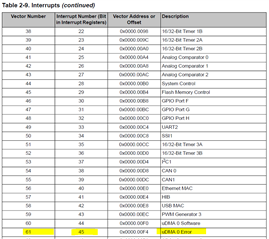I use SSI with uDMA.
When the primary channel is finished there is one interrupt, when the alternativly channel is finished there are 2 interrupts.
At this time no primary channel is started anymore.
Why is it like this?
My Hardware Config:
void init_SSI0_TO_GPIO_PA5()
{
// enable SSI1 Tx PA5 only
MAP_SysCtlPeripheralEnable(SYSCTL_PERIPH_SSI0);
while(!MAP_SysCtlPeripheralReady(SYSCTL_PERIPH_SSI0));
// port config
MAP_GPIOPinConfigure(GPIO_PA5_SSI0TX);
MAP_GPIOPinTypeSSI(GPIO_PORTA_BASE, GPIO_PIN_5);
MAP_GPIOPadConfigSet(GPIO_PORTA_BASE, GPIO_PIN_5,
GPIO_STRENGTH_2MA, GPIO_PIN_TYPE_STD);
// SSI config
MAP_IntDisable(INT_SSI0);
MAP_SSIIntDisable(SSI0_BASE, SSI_TXFF | SSI_RXFF | SSI_RXTO | SSI_RXOR);
MAP_SSIDisable(SSI0_BASE);
MAP_SSIConfigSetExpClk(SSI0_BASE, SysCtlClockGet(), SSI_FRF_MOTO_MODE_1,
SSI_MODE_MASTER, SSI_CLOCK, 8);
// ------------------ //
// Priority Levels
// Priority 4 = 0xE0 ->lower
// Priority 3 = 0x60
// Priority 2 = 0x20
// Priority 1 = 0x00 ->higher
// ------------------ //
MAP_IntPrioritySet(INT_SSI0, 0x00); // Priority 1 !!!
MAP_IntEnable(INT_SSI0);
MAP_SSIEnable(SSI0_BASE);
}
void init_uDMA()
{
MAP_SysCtlPeripheralEnable(SYSCTL_PERIPH_UDMA);
while(!MAP_SysCtlPeripheralReady(SYSCTL_PERIPH_UDMA));
// general uDMA setup
MAP_uDMAEnable();
MAP_SysCtlDelay(10);
// declare controltable
MAP_uDMAControlBaseSet(uDMAControlTable);
MAP_SysCtlDelay(10);
MAP_IntEnable(INT_UDMAERR);
init_uDMA_CH11_SSI0();
init_uDMA_CH25_SSI1();
init_uDMA_CH13_SSI2();
init_uDMA_CH15_SSI3();
init_uDMA_CH6_CH7_UART5();
}
void init_uDMA_CH11_SSI0()
{
// uDMA Channel 11 enc 0
MAP_SSIDMADisable(SSI0_BASE, SSI_DMA_RX | SSI_DMA_TX);
MAP_uDMAChannelAssign(UDMA_CH11_SSI0TX);
MAP_uDMAChannelAttributeDisable(11,
UDMA_ATTR_ALTSELECT |
UDMA_ATTR_HIGH_PRIORITY |
UDMA_ATTR_REQMASK |
UDMA_ATTR_USEBURST);
MAP_uDMAChannelControlSet(11 | UDMA_PRI_SELECT,
UDMA_SIZE_8 | UDMA_SRC_INC_8 |
UDMA_DST_INC_NONE | UDMA_ARB_4);
MAP_uDMAChannelControlSet(11 | UDMA_ALT_SELECT,
UDMA_SIZE_8 | UDMA_SRC_INC_8 |
UDMA_DST_INC_NONE | UDMA_ARB_4);
MAP_uDMAChannelAttributeEnable(11, UDMA_ATTR_USEBURST | UDMA_ATTR_HIGH_PRIORITY);
MAP_SSIDMAEnable(SSI0_BASE, SSI_DMA_TX);
MAP_SSIEnable(SSI0_BASE);
}
void uDMASSI0IntHandler(void)
{
#ifdef DEBUG_GPIO
DEBUG_PA7 = GPIO_PIN_7; // CH05 INTLED0
#endif
MAP_SSIIntClear(SSI0_BASE, SSI_RXTO | SSI_RXOR);
MAP_uDMAIntClear(11);
if (MAP_uDMAChannelModeGet(11 | UDMA_PRI_SELECT) == UDMA_MODE_STOP)
{
uDMABufferStateSSI0_PRI = EMPTY;
}
if (MAP_uDMAChannelModeGet(11 | UDMA_ALT_SELECT) == UDMA_MODE_STOP)
{
uDMABufferStateSSI0_ALT = EMPTY;
}
#ifdef DEBUG_GPIO
DEBUG_PA7 = 0; // CH05 INTLED0
#endif
}
void start_uDMA_SSI0()
{
MAP_uDMAChannelTransferSet(11 | UDMA_PRI_SELECT,
UDMA_MODE_PINGPONG, &uDMABufferSSI0_PRI,
(void *)(SSI0_BASE + SSI_O_DR),
SSI_TRANSFERSIZE);
MAP_uDMAChannelEnable(11 | UDMA_PRI_SELECT);
uDMABufferStateSSI0_PRI = EMPTYING;
uDMABufferModeSSI0 = PONG;
MAP_uDMAChannelTransferSet(11 | UDMA_ALT_SELECT,
UDMA_MODE_PINGPONG, &uDMABufferSSI0_ALT,
(void *)(SSI0_BASE + SSI_O_DR),
SSI_TRANSFERSIZE);
MAP_uDMAChannelEnable(11 | UDMA_ALT_SELECT);
uDMABufferStateSSI0_ALT = EMPTYING;
uDMABufferModeSSI0 = PING;
}




